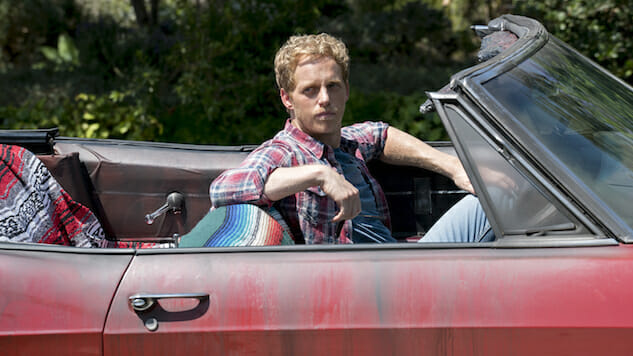What Went Wrong with You’re the Worst?
(Episodes 4.12 and 4.13)
Photo: Byron Cohen/FXX
At the midpoint of You’re the Worst’s two-part finale, Gretchen (Aya Cash) abandons Boone’s bed to start one last fire and Jimmy (Chris Geere) abandons his house to find his convertible ablaze. The bridge from “Like People” to “It’s Always Been This Way”—the latter’s title carries a whiff of “It’s Been,” the first episode of a season that’s nearly choked on the past—is Weyes Blood’s “Used to Be,” with its forthright thrum of longing, and it so perfectly encapsulates the season’s warped shape it almost reads as a mea culpa. For Gretchen and Jimmy, returning, in the end, to their postponed engagement; for Edgar (Desmin Borges) and Lindsay (Kether Donohue), largely unable to move forward despite their chances to do so; even for Vernon (Todd Robert Anderson) and Becca (Janet Varney), entering an arrangement with Paul (Allan McLeod) in order to avoid a real reckoning, the way things “used to be” has become an obsession without an outlet. I suppose I should cop to feeling the same about You’re the Worst, a series I’ve hoped against hope might recapture its voice in the season’s last stages, though I realize now that tonight’s forced emotional fireworks reflect the musical cue’s main concession. “I won’t fight fate,” the lyrics promise. “It’s now too late.”
Has it always been this way? Have the characters’ frailties always floated to the surface at the most convenient moments, emerging from leprechaun costumes and leaping from trash cans and swinging their fists in a stranger’s kitchen to stir up drama that was otherwise absent? Have their meltdowns always possessed this nightmarish quality, awaking to an absent partner or a spurt of blood as if the series were prone to sleepwalking? If the answer is “no”—I’m not ready to consider the other option, to be honest—then the explanation for You’re the Worst’s dismal season is, for me, central to the finale’s foremost shortcoming. The characters’ arcs come to a head time and again, in forlorn faces, crying jags, brutal arguments, fisticuffs, but the series has done so little to set up these payoffs that scenes intended to play as profound instead read as shallow. The new title sequence added earlier this season, with its montage of unrelated sight gags, turns out to be strangely telling: You’re the Worst wants to get us to a place as slyly affecting, as wise, as the series used to be, despite being incapable of connecting the dots.
See, for instance, Lindsay turning on Gretchen, with a “For once?” that cuts deep but comes with no warning. See Jimmy’s dialogue, suddenly rid of its studied phrasing, pared down to precise nuggets like, “I came back to town to face the music, but it didn’t want to face me.” See the ease with which Paul transforms back into the man with love in his heart, a conclusion to his misconceived arc as pat as Lindsay’s plan to save her sister’s marriage. See, most especially, the threadbare symbolism of the traffic light in the closing sequence, the careful insertion of “You fought for me,” the will they/won’t they structure of the entire hour, replicating in miniature the season’s stasis—circular narratives are catnip to me (see The Leftovers), and yet none of these elements close the circle with conviction. The season’s “lessons,” such as they are, appear in the end more stolen than earned, like an undergraduate writing EXACTLY in a novel’s margins.